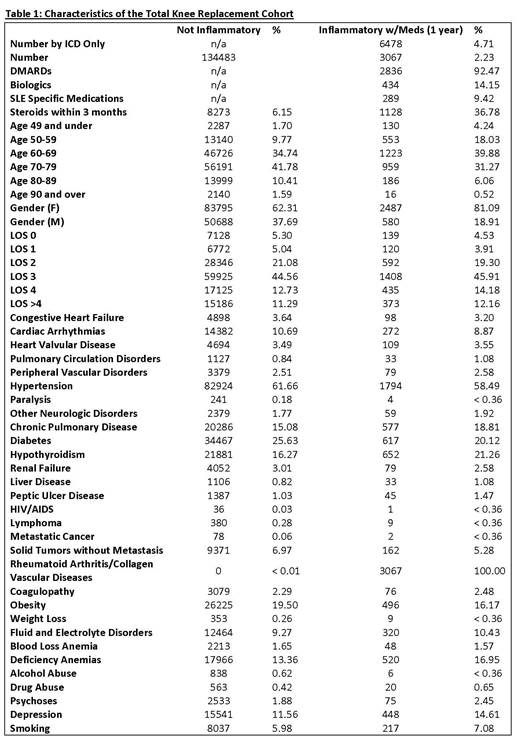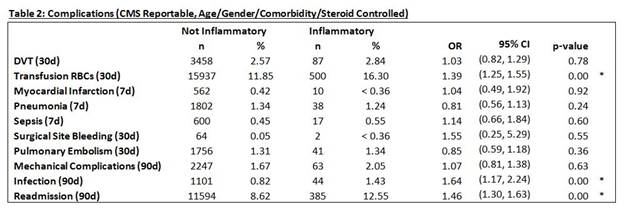Session Information
Date: Monday, October 22, 2018
Title: 4M105 ACR Abstract: RA–DX, Manifestations, & Outcomes III: Diagnosis & Prognosis II (1929–1934)
Session Type: ACR Concurrent Abstract Session
Session Time: 4:30PM-6:00PM
Background/Purpose: TKA is commonly performed in patients with a history of inflammatory arthritis. These patients are likely at higher risk of complications, from both the underlying disease and immunosuppressive medications. The purpose of this study was to perform a population-based comparison of the risk of postoperative complications between patients with inflammatory arthritis and osteoarthritis.
Methods: A national private insurance database was used to select patients undergoing unilateral primary TKA. Patients were categorized to the inflammatory cohort if they had an ICD diagnosis of inflammatory arthritis as well as treatment with a DMARD, biologic, or SLE-specific medication within the year prior to surgery. Patients with no diagnosis of inflammatory arthritis were assigned to osteoarthritis. Postoperative complications were identified using Reportable CMS Complication Measures. Risk of each complication was compared between cohorts using multivariate logistic regression controlling for age, gender, length of stay, comorbidities, and use of corticosteroids within 3 months prior to TKA.
Results: 137,550 patients were included; 2.23% met criteria for inflammatory arthritis as described above. Independent of age, gender, LOS, comorbidities, and recent steroid use, inflammatory patients were found to have higher risk of transfusion (OR 1.39, p < 0.01), infection (OR 1.64, p < 0.01), and readmission (OR 1.46, p < 0.01). There were no differences in risk of VTE, medical, or mechanical complications.
Conclusion: Independent of other comorbidities, patients with inflammatory arthritis are at high risk of transfusion, infection, and readmission. Treatment of these patients is likely more costly and efforts should be made to optimize their health and treatment medications prior to TKA to minimize their complication risk. Additionally, these results have important implications for evolving bundled payment models. Hospitals should receive commensurate resources to maintain access to TKA for patients with inflammatory arthritis that are prone to higher resource utilization.
To cite this abstract in AMA style:
Richardson S, Schairer W, Kahlenberg C, Sculco TP, Sculco PK, Russell LA, Goodman SM, Figgie MP. Complications Following Total Knee Arthroplasty in Inflammatory Versus Osteoarthritis [abstract]. Arthritis Rheumatol. 2018; 70 (suppl 9). https://acrabstracts.org/abstract/complications-following-total-knee-arthroplasty-in-inflammatory-versus-osteoarthritis/. Accessed .« Back to 2018 ACR/ARHP Annual Meeting
ACR Meeting Abstracts - https://acrabstracts.org/abstract/complications-following-total-knee-arthroplasty-in-inflammatory-versus-osteoarthritis/


